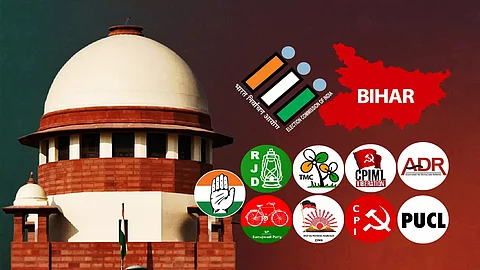

New Delhi | The Supreme Court on Thursday asked the Election Commission of India (ECI) to inform about the documents considered during the 2003 intensive electoral roll revision in Bihar.
A bench of Justices Surya Kant and Joymalya Bagchi, which resumed the hearing on a pleas challenging the June 24 ECI decision to conduct the special intensive revision (SIR) in the state said, "We would like ECI to state what documents were taken in 2003 exercise".
The remarks came after advocate Nizam Pasha, appearing for one of the parties, said referred to the court reportedly saying "if the date of January 1, 2003 (the date of earlier SIR) goes then everything goes".
"I must submit that nothing was there to show why this date is there… The impression sought to be conveyed is that it is the earlier date when the intensive exercise for revision of the electoral roll was held. It is stated that the EPIC (voter) card issued then is more reliable than issued during summary exercises conducted from time to time, is incorrect," Pasha said.
Pasha asked if the process of enrolling under intensive and summary revisions was the same then how could EPIC cards issued under summary exercises be discarded.
The lawyer, therefore, said the date of 2003 was invalid and not based on “intelligible differentia” (basis of distinguishing the two situations).
"No receipt of my enumeration form is being given or any documents acknowledging the receipt is given and therefore the booth level officers have an upper hand and these lower level officers have too much discretion on whether the form has to be taken or not," he said.
Senior advocate Shoeb Alam, appearing for another petitioner, pointed out insufficient reasons in the ECI notification saying the process invented was neither "summary" nor "intensive" but just a creation of the notification.
"This is a process of voter registration and cannot be a process of disqualification. This is a process to welcome and not turn this into a process to unwelcome," he said.
The top court on August 13 observed electoral rolls cannot remain "static" and there is bound to be a revision, the top court said the expanded list of acceptable documents of identity from seven to 11 for Bihar's Special Intensive Revision (SIR) of voters' list was in fact "voter-friendly and not exclusionary." As the row over the SIR escalated, the bench said the EC had the residual power to conduct such an exercise as it deemed fit.
The bench also disagreed with a submission by a petitioner that the SIR of electoral rolls in poll-bound Bihar had no basis in law and ought to be quashed.
Leaders of opposition parties including the Rashtriya Janata Dal (RJD) and the Congress and the NGO Association of Democratic Reforms (ADR) have challenged the electoral roll revision drive in Bihar.
